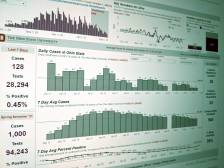Google, Ohio State join to fight COVID-19 vaccine misinformation

Faculty at Ohio State University recently announced they’re working with Google on how to limit the spread of misinformation about COVID-19 vaccines.
Thomas Wood, assistant professor in Ohio State’s political science department, said in an announcement last week that it’s important for people receive correct information about the vaccine to increase the public’s confidence in it. There have been false claims about the dangers of the COVID-19 vaccines across social media, including baseless rumors that the inoculations would kill or sterilize the recipients, alter DNA or fail to keep up with virus mutations.
Along with two assistant professors from George Washington University and Columbia University, Wood will study what headlines and sources are most effective in correcting COVID-19 vaccine misinformation and whether they can increase willingness to take a COVID-19 vaccine.
“COVID-19 vaccine hesitancy is going to be a significant public health problem of the coming year,” Wood said in a press release, adding that the public’s polarized response to health guidance has contributed to the spread of false information and increased concerns over its safety.
This research project will support an upcoming website, run by the Australian Science Media Centre and the nonprofit Meedan’s Digital Health Lab, designed to bring journalists and fact-checkers the latest scientific information about the vaccines and provide around-the-clock access to scientific research.
Misinformation about the vaccines spread on social media even before it was distributed, with people falsely claiming that the current COVID-19 vaccines are unsafe and ineffective. More elaborate conspiracy theories include a baseless claim that the vaccine contains a microchip.
“Journalism continues to play a crucial role in informing people about the pandemic, sharing expert knowledge about vaccines, and proactively debunking misinformation about the immunization process,” Google’s press release reads.
Wood said that historically academics have been pessimistic about the ability to correct political misinformation, but that research has shown people can be persuaded.
Similar efforts at other universities have also tried to help keep people correctly informed, including researchers at Arizona State University who are working to develop artificial intelligence that can detect fake news and help prevent the spread of disinformation and Duke University researchers supporting advancement of live, automated fact-checking through a mobile app.




